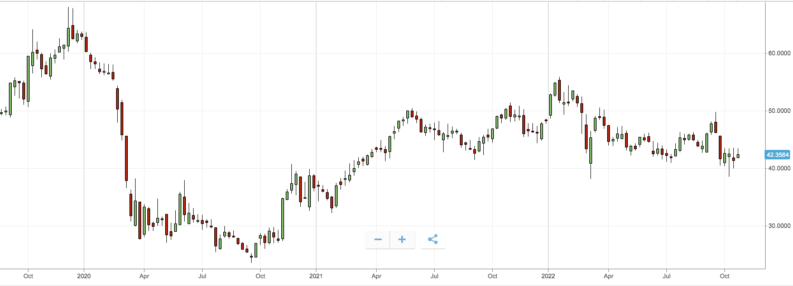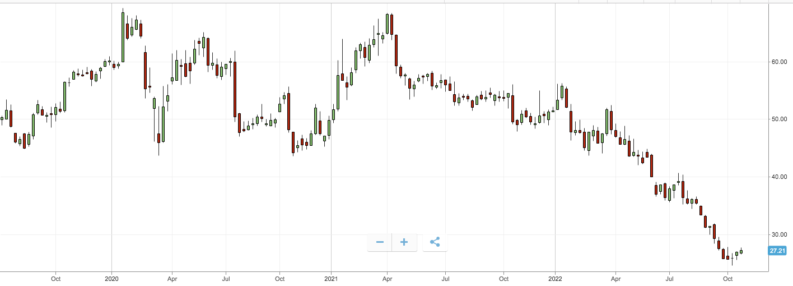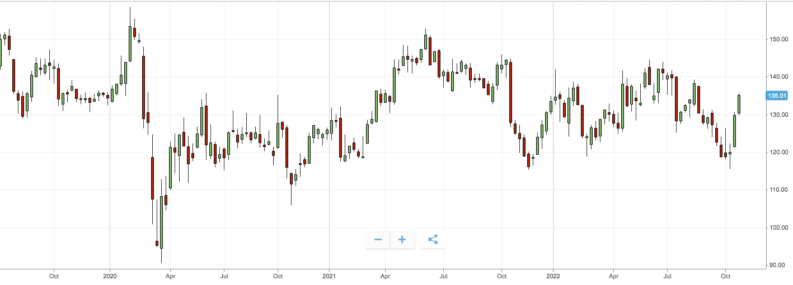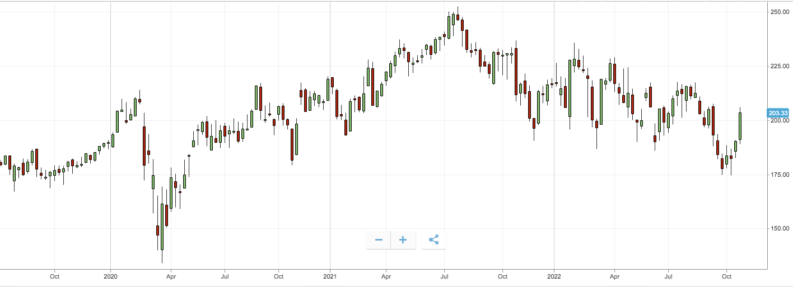To date, 2022 has been a year marked by distinct economic uncertainty. Owing to geopolitical factors and the continuing challenges and uncertainties surrounding many world economies post-COVID, the markets have been host to continued falls, lower than expected peaks and continued volatility. With the S&P 500 currently down by 20%, there are many stocks trading at a steep discount to the prices of last year, which leads us to the question, ‘is now the time to start investing?’
eToro is a multi-asset investment platform. The value of your investments may go up or down. Your capital is at risk.

Let’s explore further as we analyse if the current factors and trends present in the market make this a good time to invest – or not, as the case could be, and answer the question ‘is now the time to start investing?'
Table of contents
Define Your Budget
The first step to take when considering if now is the time to start investing is to define your budget. Just as one cannot predict the future with any certainty, opportunistic trading will often not work.
While the current state of the market presents traders with a range of lows, buying at these lows and selling at the highs, in practice, is certainly a challenge. Markets never stop going up and down, so there is never a perfect day to buy. Even with perfect knowledge of the market, it would be impossible to know precisely when to buy and when to sell.
The goal is to be as ‘less wrong’ as possible and allocate funds within your present means.
By picking the stocks of businesses that have sound fundamentals at regular intervals on a pre-defined budget, you will reduce the number of emotive plays you make and make better, more rational decisions, opening the door to allowing your investments to grow steadily.
Tips for Sensible Trading
The current economic landscape means that those looking to trade may well encounter discounted stocks, which is one of the main reasons you may feel now is the time to start investing. When considering whether to invest in such stocks, it is important that traders don’t wander into some of the pitfalls of investing – one such pitfall is the ‘value trap’.
A value trap is a stock that appears to be undervalued based on traditional valuation metrics like price-to-earnings (P/E) or price-to-book (P/B). However, the stock is actually overvalued based on its future prospects. In other words, if the stock looks like value for money could actually be a bad deal.
Do Your Homework
First and foremost, the most important step is to do your homework. Don’t just blindly buy a stock because it’s trading at a low price. AskTraders is a valuable resource, providing traders with a host of analysis to ensure such a scenario doesn’t come into being. Our articles on the best starter stocks for beginners, guidance on how to be a sensible investor and the best ETFs to buy during a recession can be a valuable resource for traders in this case.
Make sure you understand the company’s business model and its competitive advantages. Research the stock and read the companies’ financial reports.
Avoid Companies With Bad Fundamentals
Often when a stock is trading at a steep discount, there are genuine concerns with either its product, market segment prospects, or risks in its operations.
Ideally, the investor will be able to identify the kinds of issues facing the company at any given point in time. For companies that are selling a product that has become long in the tooth or have seen declining demand for their core offerings, it is best to avoid a company such as this.
The stocks of companies that are experiencing cyclical downturns but maintaining or even growing market share, whilst operating a sound balance sheet present the greatest opportunity.
Some examples of companies currently trading much lower but hide a myriad of issues below the surface include Beyond Meat (NASDAQ:BYND) and Robinhood Markets (NASDAQ:HOOD).
Both companies are presently priced a fraction of what they were at the start of the year. The investor needs to be mindful that sometimes it’s less than a company being out of favour and more to do with genuine operational and financial hurdles to overcome.
BYND and HOOD are burning through cash and will need to further dilute equity and increase borrowings in order to keep their vision alive, elements that are a threat to profitable equity ownership today.
Four Stocks For You To Consider Today
Aside from the above, right now, there are a number of stocks and sectors that are trading at a discount relative to their recent past, each with an ability to withstand market pressure and rise from their present lows. We have compiled four value propositions that are worth considering if you feel now is the time to start investing for you.
- Lloyds Banking Group plc (LSE:LLOY)
- Intel Corp (NASDAQ:INTC)
- International Business Machines NYSE:IBM (IBM)
- Visa NYSE:V (V)
Lloyds Banking Group plc (LSE:LLOY)
On the surface, LLOY is down a modest 10% on the year. When priced in US dollars, the selloff is a more marked 26%.
Record government spending under COVID lockdowns, Brexit, geopolitical upheaval and the concurrent reopening of Europe has provided the fuel to spark an inflation explosion.
After LLOY released loan loss provisioning last year, as the country exited lockdowns, the board is making moves to set aside cash in anticipation of more defaults this year and next under the cost of living crisis.
Seemingly moving from one crisis to the next has had this stock on the back foot for some time. Yet the fundamentals of LLOY are sound and even though the UK economy is struggling under high costs, it has one critical element going for it, low unemployment.
While unemployment is at the extremely low level of 3.5%, mortgages and bills will be paid and LLOY bottom line will remain secure for now.

Currently trading at a P/E ratio of 7.1 with a forward dividend yield of 5%, LLOY offers an attractive value proposition relative to its US cousins. JP Morgan (NYSE:JPM) and Wells Fargo (NYSE:WFC) are currently trading with dividend yields of 10.5 and 11.9, respectively. All are factors that indicate strong investment incentives.
Intel Corp (NASDAQ:INTC)
Chip-making behemoth INTC has seen its share price come under great pressure this year, down over 50%. With most chipmakers giving up ground as the market anticipates a slowing in demand for cloud servers as companies and employers return to work. The current trailing-twelve-month (TTM) gross margin has slipped to below 50%, revenues on a TTM basis are 7% down on 2021 levels.
INTC’s P/E is currently priced at an extremely attractive 5.8. By comparison, its competitor AMD is currently trading at a multiple of over 24.
As highlighted, investors should always be wary of the value traps of perceived value under slowing revenue. The moderation in INTC sales was to be expected post-COVID and it is more likely than not to return to a growth phase.

With the above fundamentals aside, INTC is still one of the largest chipmakers in the world. With its large R&D combined and its multi-decade expertise in the field, INTC will continue to find markets to exploit with its bleeding-edge technology.
This is certainly one to consider when deciding whether now is the right time to invest.
International Business Machines (NYSE:IBM)
In a US market that is down 20% year-to-date, one stock has bucked that trend. Through a 15% rally over the last month, it has not given up any ground to a challenging 2022.
That stock is the famous technology corporation, IBM. The Trailing-twelve-month gross margin here is improving to 62% from last year’s 54%. IBM’s revenues continue their climb to pre-pandemic levels. Furthermore, the unwinding of its supply chain issues that mired the pandemic era means that IBM is certainly worth your consideration.
After missing the cloud computing rush and being surpassed by Microsoft, Amazon, and Google in that regard, IBM has struggled to win back investors to their value propositions. However, IBM has a long and storied history of research and development and if some of its business decisions miss the mark, over time, IBM has been able to come back with high-value-added products and services.

With IBM’s cloud revenue starting to climb quickly and as it narrows in on the performance of its peers, the P/E ratio here is currently at a decent 22 given revenues are growing at near 20% year-over-year.
Indeed, if you are considering the value proposition of a company that is presently on the upswing rather than attempting an about-turn in fortunes, IBM is definitely worth your attention.
Visa (NYSE:V)
In line with the global downturn in stocks, Visa has shed 6% on the year. This is despite revenues continuing to grow, up over 20% on the year.
The P/E ratio of close to 30 is reflective of Visa’s solid underlying growth in revenue and well above the S&P 500 average of 20 for the P/E.
Visa’s business model has flourished in the new cashless world, with more and more retailers adopting instant card reading technology in place of cash. As such, in line with the continuing climb in e-commerce and other digital partnerships, Visa’s sales have soared.
Indeed, as Visa’s gross margin continues to ratchet higher as it finds more ways to extract every dollar from sales for its shareholders.

While Visa may not offer the same low share price relative to some other sectors, it is an integral part of the global payments ecosystem now and into the future. Its strong business performance will not disappoint shareholders and those looking to invest in this ever-popular stock at this point in time.
Final Thoughts
Importantly, given the current state of the markets, as we have outlined, the key factors to employ in your trading strategy are to pay attention to news and earnings reports, maintain a long-term perspective and have a clear plan before you trade.
It is impossible to precisely time the absolute lows and highs in stocks when investing, but if you are careful to conduct your research, set out a clear plan and refine the plan as you learn from your mistakes, you will inevitably make better decisions, and become a successful investor, no matter the economic or geopolitical climate.
In the end it will always come down to personal circumstances, but when it comes to the question ‘Is Now The Time To Start Investing?' there are certainly opportunities you could take advantage of in the current market.
People Who Read This Also Read:













